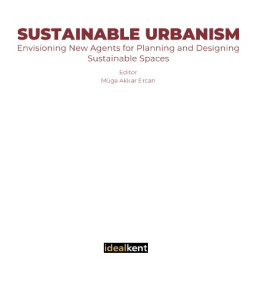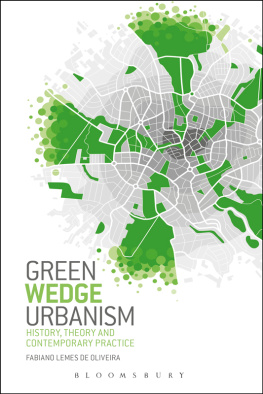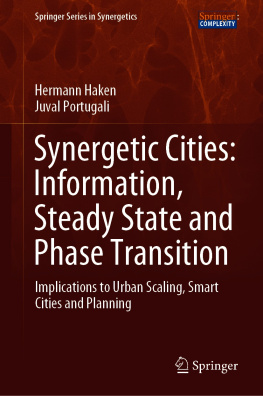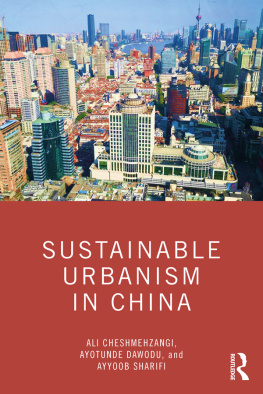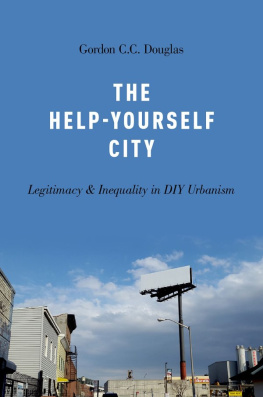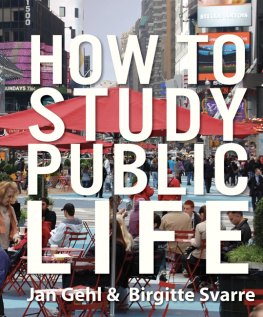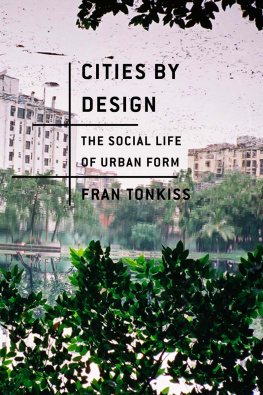
JUST SUSTAINABILITIES: POLICY, PLANNING AND PRACTICE
Just Sustainabilities contributes to understanding, theorising and ultimately developing strategies towards the development of more just and sustainable communities in both the global North and South. Through a collection of solutions-orientated books, the series looks at policy and planning themes that improve peoples quality of life and well-being, both now and into the future; that are carried out with an intentional focus on just and equitable processes, outputs and outcomes in terms of peoples access to environmental, social, political and economic space(s); and that aim to achieve a high quality of life and well-being within environmental limits.
SERIES EDITOR
Julian Agyeman
TITLES ALREADY PUBLISHED
Introducing Just Sustainabilities: Policy, Planning, and Practice , Julian Agyeman,
Energy Justice in a Changing Climate: Social Equity and Low-carbon Energy , Edited by Karen Bickerstaff, Gordon Walker and Harriet Bulkeley,
Social and Solidarity Economy: Beyond the Fringe , Edited by Peter Utting
Eco-Homes: People, Place and Politics , Jenny Pickerill
Urban Sustainability and Justice: Just Sustainabilities and Environmental Planning , Vanesa Castn-Broto and Linda Westman
INTERCULTURAL URBANISM
CITY PLANNING FROM THE ANCIENT
WORLD TO THE MODERN DAY
Dean Saitta
Intercultural Urbanism: City Planning from the Ancient World to the Modern Day was first published in 2020 by Zed Books Ltd, The Foundry, 17 Oval Way, London SE11 5RR, UK.
www.zedbooks.net
Copyright Dean Saitta, 2020
The right of Dean Saitta to be identified as the author of this work has been asserted by him in accordance with the Copyright, Designs and Patents Act, 1988
Typeset in Plantin and Kievit by Swales & Willis Ltd, Exeter, Devon
Index by Rohan Bolton
Cover design by Burgess & Beech
Cover photo Gargolas/Getty Images
Printed and bound by CPI Group (UK) Ltd, Croydon, CR0 4YY
All rights reserved. No part of this publication may be reproduced, stored in a retrieval system or transmitted in any form or by any means, electronic, mechanical, photocopying or otherwise, without the prior permission of Zed Books Ltd.
A catalogue record for this book is available from the British Library
ISBN 978-1-78699-409-7 hb
ISBN 978-1-78699-411-0 pdf
ISBN 978-1-78699-412-7 epub
ISBN 978-1-78699-413-4 mobi
CONTENTS
Dean Saitta is Professor of Anthropology and Director of the Urban Studies program at the University of Denver. His research interests include ancient city planning and design, comparative architectural and urban form, and North American archaeology. He is a co-author of Denver: An Archaeological History (2000).
I thank the editors and support staff at Zed Books, especially Kim Walker, for their patience and advice during the preparation of this book. The excellent scholarship of two fellow anthropologists, Setha Low and Michael E. Smith, has driven my interest in urban culture and materiality for many years. I am grateful to Monica Smith for sending me a copy of her just-published book about ancient cities as I was finishing the writing of my own. It was an inspiration. Nina Glick Schiller and Rita Wright were gracious hosts for a January, 2019 public lecture at the New York Academy of Sciences in which the central ideas of this book were presented. I especially thank Scott Hutson for his intellectual support and detailed critical review of the manuscript.
I am grateful to Phil Wood for his invitation to attend the Council of Europe Intercultural Placemaking Seminar in Venice in June, 2012. Phil and Noha Nasser, a fellow attendee, have given me valuable insights into the theory of interculturalism and the practical challenges of producing the Intercultural City. I thank James Brasuell, Managing Editor of the public interest urban planning website Planetizen , for welcoming me as a contributing essayist to his site in July, 2014. Writing for Planetizen was formative to the writing of this book.
Several University of Denver colleagues and some close friends saw me through the many months of developing and completing the book. I am especially grateful to Christina Kreps, George DeMartino, Ilene Grabel, Scott Leutenegger, Orla McInerny, Mario Lopez, Zulema Lopez, Paul Sutton, Sharolyn Anderson, Tanya Coen, David Lacy, Barbara Lacy, Phil Duke, Sean Dollard, and Kyle Cascioli. Kyle helped me launch, and continues to web host, my blog Intercultural Urbanism .
I thank my colleagues at the University of Bologna, Portland State University, and the University of Denver for their contributions to a 20092012 US Department of EducationEuropean Union Atlantis grant that explored, though exchanges of students, faculty, and many ideas, the topic of Global Cities and Global Citizenship in the Urban Age. These collaborators included Franco Minganti, Elena Lamberti, Gabriele Manella, Kathi Ketchison, Roberta Waldbaum, and Linda Olson. Giovanna Franci, now deceased, was the inspiration and guiding light of this international effort.
Rupert Jenkins made many visits on weekend mornings to watch English Premier League football, providing welcome relief from the stress of book writing. Likewise, I owe thanks to my fellow ice hockey players who, during our weekly scrimmages at the University of Denver campus rink, continually inquired about progress and offered valuable non-academic advice. These include Alex Ringsby, Dave Lyons, Jerry Covill, Boris Vilensky, Robert Bond, T.C. Oxley, James Cramer, John Zagnoli, Adam Christopher, Fletch Neeley, and many other Daves, Larrys, Mikes, and Johns.
I thank my former students Shaylee Zaugg and Kassandra Neiss, both now practicing professionals, for discussions related to their thesis work that enriched this book. It is comforting to know that applied urban studies scholarship is in their capable hands.
Julian Agyeman urged me to write this book and has been a steady source of inspiration and wise counsel. I am truly grateful for his friendship and support.
My Park Hill neighbors, especially Matt and Melissa Bradford, Theresa and David Johnson, Richard and Linda Weiss, Christine and Tim Dea, and David Wolf helped me understand the citizens perspective on the physical and political changes occurring in Denver. My soul mate Martha Rooneya trained architect and landscape architecthelped focus my thinking with her knowledge of those fields and many clarifying discussions. Martha and our son Joe have been supportive of, and patient with, my academic pursuits for many, many years.
This book is dedicated to my family, neighbors, international colleagues, and citizens everywhere who care about the physical character and human quality of their communities.
It is widely proclaimed that we live in an Urban Age. Popular and scholarly commentary is full of references to humankind now being an urban species: Homo urbanis (:) and animated discussions about what the city is, and whether the city is the creator of the global environmental and social sustainability problems that bedevil us, or the solution.
We can debate the veracity of the many claims made about cities and whether todays urban growth is unprecedented in human history. However, it is certainly the case that we are living in a key urban moment. With their status as crucibles of innovation and engines of economic opportunity it is undeniable that cities are major attractors of human population. It is also undeniable that the urban built environment its form and design has a huge impact on how people live in cities. It affects their opportunities for interacting within and across social group boundaries, their ability to accumulate social capital (:) puts it, urban spaces have become strategically essential to political-economic and sociocultural life around the world, and to emergent visions of possible planetary futures.


